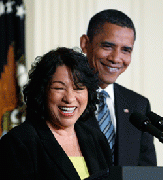WASHINGTON — President Obama made history Tuesday by nominating the first Hispanic to the U.S. Supreme Court, Sonia Sotomayor, a judge on the U.S. Court of Appeals for the Second Circuit.

|
|
U.S. Appeals Court Judge Sonia Sotomayor (L) steps up to speak after U.S. President Barack Obama announced her as his choice of nomination for the Supreme Court justice to replace retiring Justice David Souter, in the East Room at the White House, May 26, 2009. REUTERS/Jim Young |
In nominating Sotomayor, Obama cited her professional achievements and compelling personal story, calling her an “inspiring woman who I am confident will make a great justice.”
“It doesn’t matter where you come from, what you look like, or what challenges life throws your way. No dream is beyond reach in the United States of America,” Obama said.
In a statement in the East Room ceremony announcing her nomination, Sotomayor said, “Never in my wildest childhood imaginings … did I ever dream that I would live this moment.”
Obama heads into his first Supreme Court nomination with a strong hand in the Senate, where Democrats control 59 seats out of 100, and potentially 60 when the disputed Minnesota Senate race is resolved. Barring a scandalous revelation about Sotomayor, she is expected to be confirmed.
But conservatives do not intend to go down without a fight. They appear poised to use Obama’s nomination of Sotomayor as a way to frame the president’s governing philosophy as outside the mainstream. Sotomayor’s record includes involvement in a controversial affirmative-action case involving firefighters in New Haven, Conn., that is currently before the Supreme Court.
Fighting Sotomayor’s nomination presents conservatives with a tricky calculation. Even if they score points on her jurisprudence, the struggling Republican Party can ill afford to alienate Hispanics and women more than it already has. In the last election, Obama won both groups by wide margins.
At age 54, she would be the second-youngest member of the court, after Chief Justice John Roberts, thus potentially setting up decades of clashes between what are expected to be competing views of the Constitution on a variety of issues.
Sotomayor has served on the federal bench for 16 years, as a U.S. district court judge in New York City from 1992 to 1998 and as a judge on the Second U.S. Circuit Court of Appeals in New York from 1998 to present.
Her record of judicial decisions is long and deep. It includes a 1995 ruling as a federal judge in the Major League Baseball strike case, and a decision as a member of a three-judge appeals-court panel that upheld a ruling throwing out a firefighter promotion test in New Haven, Conn., because no African-American candidates received a high enough score to qualify for promotion.
With nearly two months before expected confirmation hearings in the Senate, Sotomayor’s record will endure microscopic scrutiny.
The examination will focus on her intellect, her ideology and her temperament. Given her long service in the federal judiciary, the examination should offer by the time of the hearings a clearer picture of her potential approach to the law as a justice than any of the current sitting justices.
Sotomayor’s personal story is a quintessentially American success story. Born in the Bronx to Puerto Rican parents, she was diagnosed with diabetes at age 8. Her father died when she was 9, and she and her brother were raised by their mother, a nurse, in a housing project near Yankee Stadium.
She graduated summa cum laude from Princeton University in 1976, and from Yale Law School in 1979. After law school, she prosecuted violent criminals in the District Attorney’s Office in New York from 1979 to 1984. She then worked for eight years in private practice representing international corporate clients at Pavia & Harcourt in New York, before being nominated by President George H.W. Bush to a federal judgeship.
She was later nominated by President Clinton to her current post on the appeals court. She was confirmed in 1998 by a vote of 67 to 29 to 2.
Conservative groups issued statements critical of Sotomayor as soon as her name was leaked to the press early Tuesday morning.
“Judge Sotomayor is a liberal judicial activist of the first order who thinks her own personal political agenda is more important than the law as written,” said Wendy Long, counsel to the conservative Judicial Confirmation Network, in a statement. “She thinks that judges should dictate policy, and that one’s sex, race, and ethnicity ought to affect the decisions one renders from the bench.”
Liberal groups were also quick to react, issuing statements of support. “In Judge Sotomayor, we believe President Obama has found a nominee who will help ensure that the Constitution and laws are faithfully applied and remain true to their intended purpose as guardians of our rights, liberties and equality,” said Doug Kendall, president of the Constitutional Accountability Center, in a statement.
-Christian Science Monitor News Service






Leave a Reply